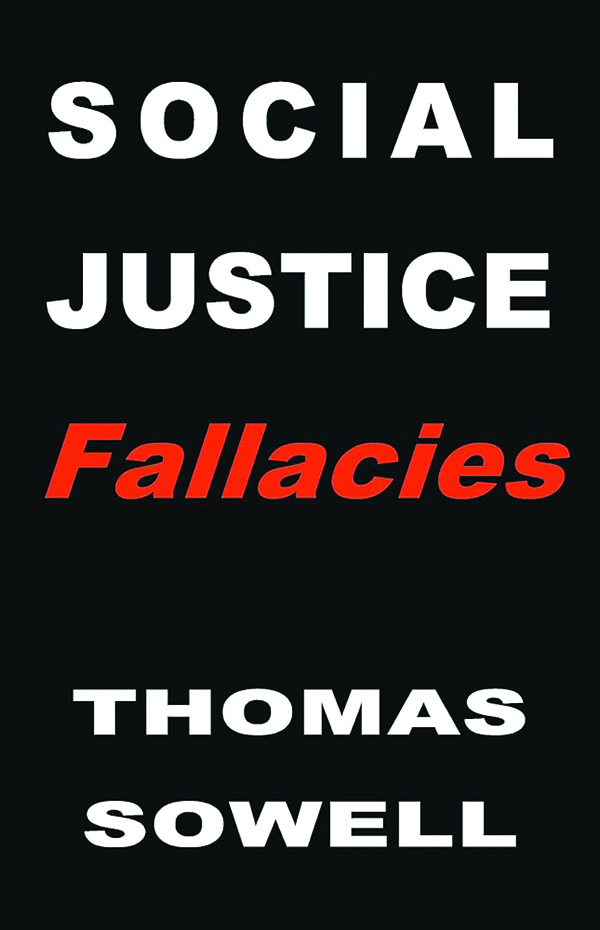
It doesn’t take Thomas Sowell long to dispatch social justice
Jack Elbaum
Thomas Sowell is among the most prolific yet underappreciated public intellectuals of the past half-century. A University of Chicago-trained economist who has taught at schools such as Cornell and UCLA, the 93-year-old is a scholar who has been a senior fellow at Stanford University’s Hoover Institution since 1980 and an author who has written more than 50 books on subjects pertaining to economics, education, race, and political philosophy. The quality of his output has been even more impressive than its quantity. Light on rhetoric, seriously heavy on data, and accessible in style, there is a reason why Sowell has been described as “among the most brilliant thinkers in the world today” by Harvard University’s Steven Pinker and an “American sage” by the Wall Street Journal.

His new book, Social Justice Fallacies, clocks in with only 130 pages of text. Its aim is to slice through the rhetoric and bypass the debates characteristic of day-to-day politics by addressing the assumptions underlying what he terms the “social justice vision.” That task is difficult because of that vision’s precipitous rise over the past decade and its acceleration since 2020. Yet, it is crucial for the same reason. We should not want to live in a society in which the premises of the dominant intellectual paradigm are based on utter falsehoods — taken as axiomatic rather than ever proven empirically.
DEMOCRACY DERBY: HOW THE KENTUCKY GOVERNOR’S RACE COULD SERVE AS A SPRINGBOARD INTO 2028
The assumption upon which the entire social justice vision rests is that people and groups would achieve relatively similar outcomes if it weren’t for the singular factor of “discrimination by dominant majorities against subordinate minorities.” Sowell notes that “we can read reams of social justice literature without encountering a single example of the proportional representation of different groups in endeavors open to competition — in any country in the world today, or at any time over thousands of years of recorded history.” There are a million reasons for this, Sowell says, including history, culture, geography, and age; they all contribute to inequalities we see between groups and people. Past and present discrimination is part of that equation, but it is one factor out of many. Data show that there are significant inequalities even inside individual families — in a family with five children, firstborns are more likely to be a National Merit finalist than the other four children combined despite growing up under the same roof, for example.
That there are more factors contributing to inequality than discrimination alone may sound like a commonsense observation. Every outcome in the world is a consequence of innumerable variables interacting in a unique way. But the most prominent social justice activists in the country, the people setting the standard for what constitutes proper progressivism, scoff at that. MacArthur “genius” and antiracist guru Ibram X. Kendi wrote in his book, Stamped From The Beginning, “that racial discrimination is the sole cause of racial disparities in this country and the world at large.”
It is not difficult to see how this initial erroneous belief can lead to many more erroneous beliefs. If equal outcomes were truly the natural state of the world, where there were not equal outcomes, we could immediately assume some sort of injustice took place. If all that were right, it would be only natural to dedicate the entirety of one’s politics to trying to restore that “natural state” through government action. Sowell explains that the issue, aside from the mistaken premise, lies in the diffuse nature of knowledge in society. Because knowledge is not concentrated, government “experts” don’t have the ability to “arrange” society in a way that restores us to our supposedly natural state of equal outcomes. Consequently, there is a significant gap between the desirability and feasibility of government action, the latter of which is far more important than the former. Yet social justice activists neglect that crucial, albeit unfortunate, truth, leading to a mistaken philosophy and disastrous policy outcomes, as Sowell demonstrates through specific examples.
As the book progresses, it builds on itself nicely. That said, much of the ground covered here by Sowell is ground he has covered many, many times before. The first two chapters, “‘Equal Chances’ Fallacies” and “Racial Fallacies,” were studied much more in-depth in books such as Discrimination and Disparities (2018) and Wealth, Poverty, and Politics (2016). Chapter three, titled “Chess Pieces Fallacies,” is filled with data previously outlined in Basic Economics (2014) and Economic Facts and Fallacies (2011). Later chapters on knowledge draw from his prior work on the subject as well. It is not a surprise that Sowell used Social Justice Fallacies as an opportunity to hammer home some of his career’s most important insights, but if one is looking for a more in-depth examination of any of them, there are other places to look.
But this book provides a quicker read for anyone who does not wish to read numerous books between 300 and 500 pages, allowing a greater number of people to internalize Sowell’s perspective. It can equip anyone with the facts and concepts necessary to undercut the entire premise of a vision that is, at least for now, ascendant. And, in that way, Sowell’s newest book is yet another winner.
CLICK HERE TO READ MORE FROM THE WASHINGTON EXAMINER
Jack Elbaum was a summer 2023 Washington Examiner fellow.
